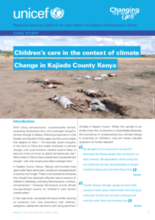With rising temperatures, unpredictable rainfall, increasing biodiversity loss, and prolonged droughts, climate change is already affecting ecosystems in the Eastern and Southern Africa region and the communities that depend on them. For example, recent droughts in the Horn of Africa are widely attributed to climate change, with such extreme weather events likely to become more common as global temperatures rise. Many areas of Kenya have experienced unprecedented drought, with five consecutive below-average rains.
In Kajiado County, Kenya, Maasai communities have seen cattle herds decimated, resulting in increased levels of poverty and hunger. There is some evidence indicating that drought has adversely affected various aspects of children’s well-being, including their education, nutrition, and protection. However, the impacts of such climate change-related events on children’s care remain understudied.
In this case study the authors explore this issue further, drawing on evidence from nine interviews with children, caregivers, residential care home staff and government officials in Kajiado County. Whilst this sample is too small to draw firm conclusions, it nevertheless illustrates the importance of understanding how climate change is impacting on children’s care and raises valuable questions for further research.
The Regional Learning Platform on care reform for Eastern and Southern Africa provides an opportunity for government, UNICEF and others involved in care reform in the region to share learning through webinars, document exchange, a HelpDesk, and pairing and mentoring. The platform and its corresponding documentation was planned and conceptualised by UNICEF Eastern and Southern African Regional Office (ESARO) and Changing the Way We Care.

